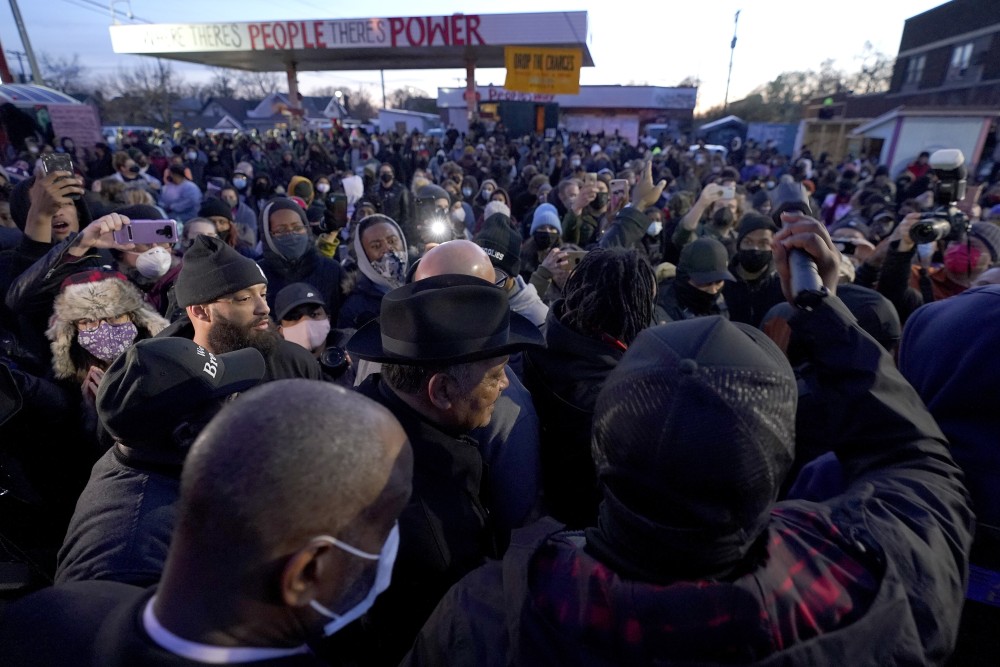Faith leaders hope Chauvin verdict lifts justice work

Faith leaders in Minnesota and across the United States expressed hope that their advocacy work for racial justice will gain momentum from the guilty verdict rendered against Derek Chauvin, the former police officer convicted of killing George Floyd.
“My prayer is that this does really invigorate all of us to want to work on the things that really matter . . . breaking down the barriers of White supremacy, providing access to those who have been marginalized,” said Stacey L. Smith, pastor of St. James African Methodist Episcopal Church in St. Paul and presiding elder of the AME Fourth District.
Read our latest issue or browse back issues.
“I’m happy about what has taken place and the verdict—but I know there’s tons of work that needs to be done. It’s just the beginning.”
Erich Rutten, the White pastor of St. Peter Claver, a Roman Catholic church in St. Paul with a predominantly Black congregation, said one of his parishioners texted him after the verdict to say, “Thank God—literally.”
“I feel relieved,” Rutten said. “It feels like this represents a shift towards holding police to a higher standard of accountability.”
Chris Johnson, a pastor at Good Hope Missionary Baptist Church in Houston, grew up with Floyd in the city’s Cuney Homes public housing complex. He hailed the verdict as a historic moment and a litmus test for the criminal justice system.
“What we just witnessed was the wheels of justice turning finally in the direction of minorities in this country,” said Johnson, who wore a red T-shirt that read, “I can’t breathe,” the words uttered by his friend while handcuffed and pinned at the neck under Chauvin’s knee.
“This is going to have global ramifications on both sides of the issue,” Johnson added. “For police officers, they now have to think twice about how they interact with minorities. For those who are being policed, we understand that this could possibly signify a change in law enforcement’s attitude toward Black and Brown people in this country.”
William J. Barber II, cochair of the Poor People’s Campaign, agreed with others that there is still work to be done.
“We must meet this public act of justice and accountability with federal legislation that will hold officers of the law accountable in every state,” Barber said. “And we must continue to work in every community to shift public investment from overpolicing poor, Black and Brown communities to ensuring restorative justice and equity for all people.”
The verdict came as the nation’s largest Protestant denomination, the Southern Baptist Convention, finds itself roiled by racial tensions. Some Black pastors have left and others are voicing dismay over pronouncements by the SBC’s six seminary presidents—all of them White—restricting how the subject of systemic racism can be taught at their schools.
One of the SBC’s most outspoken Black pastors, Dwight McKissic of Cornerstone Baptist Church in Arlington, Texas, welcomed the guilty verdict.
“God has spoken, let the church say, Amen,” McKissic tweeted. “Verdict indicates America has taken major step toward justice for all.”
“We can see to it that no one else ever faces the awful killing experienced by George Floyd and countless others,” said Russell Moore, head of the SBC’s public policy arm. “And, as we do so, we can weep. Even as we are glad for justice done, we should weep for injustices still at work, and for a life that is still gone.”
Bernard Hebda, archbishop of the Catholic Archdiocese of St. Paul and Minneapolis, said the jury’s decision underscored months of soul-searching that many people experienced as they confronted the “chasm that exists between the brokenness of our world and the harmony and fraternity that our Creator intends for all his children.”
Jonah Dov Pesner, senior vice president of the Union for Reform Judaism, called the verdict an “important chapter in the pursuit of justice.”
Bernice King, CEO of the Martin Luther King Jr. Center for Nonviolent Social Change, said, “Oh, that George Floyd were still alive. But I’m thankful for accountability. The work continues.” Then, echoing her father’s famous words, she continued, “Justice is a continuum. And America must bend with the moral arc of the universe, which bends toward justice.”
—Associated Press






